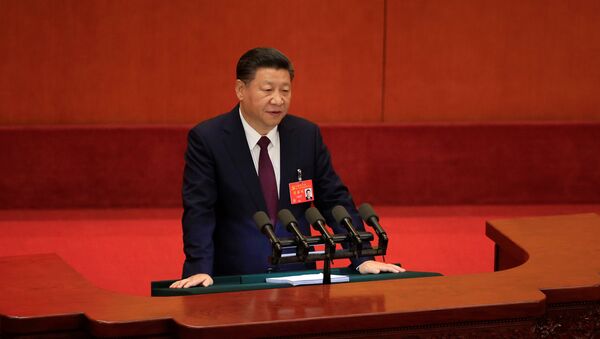According to Chinese Vice Finance Minister Zhu Guangyao, Beijing will stick to a more open-market policy, easing restrictions imposed on the share of foreign ownership in China's financial companies. Similar measures would also be adopted in regards to the companies working in the sphere of insurance, but in this sector, the limitations would be lifted in five years.
"China has made a decision to ease the limitations related to the share of foreign investors in the companies managing foundations, securities and specializing in the trade in futures up to 51 percent. After the approval the new limitations will be in effect for three years and after this period they will be lifted and the share of investments will not be limited anymore," Zhu said.
The statement was made in wake of the talks between Chinese President Xi Jinping and his US counterpart Donald Trump, with trade being high on the agenda. The meeting between the US president and his Chinese counterpart Xi Jinping has resulted in a number of trade agreements worth $253.4 billion, with the US and Chinese companies signing a number of deals worth $9 billion.
During a joint press conference, Trump has stated that "the United States really has to change its policies because they’ve gotten so far behind on trade with China and frankly with other countries."
READ MORE: US Senate Proposes Tougher Foreign Investment Review Amid Trump's Visit to China
At the same time, the US Senate has proposed a tougher review of foreign acquisitions, mergers and other investments, while Chinese companies and wealthy people have increasingly invested in America's latest technologies, including artificial intelligence.
China's Import
"According to forecasts, China will import goods worth of $24 trillion over the next 15 years. China will attract $2 trillion of foreign investments, while the sum of Chinese investments abroad will amount to $2 trillion," Chinese President Xi Jinping said at the Asia-Pacific Economic Cooperation (APEC) Summit in Vietnam Friday.
According to WTO statistics, China imported goods worth almost $1.6 trillion in 2016 and $1.7 trillion in 2015. The Chinese import of goods reached its peak in 2014 amounting to almost $2 trillion.
China has become a fundamental pillar of the cross-border shopping sector. An estimate by the China e-commerce research center finds that by 2018, the number of Chinese consumers buying overseas products, known as haitao in Chinese, will reach 35.6 million, pushing the overall market above 1 trillion yuan. This was achieved also with the help of relatively loose regulations and several favorable policies launched by the government.
READ MORE: Cross-Border Retail: Solution to US-China Trade
Great Ambitions
The Chinese president has revealed that the country was eager to create a global network of free trade areas.
READ MORE: 'Emotive Question': Why China Poised and Ready to Become World's Superpower
"We will speed up negotiations with partner countries on the conclusion of free trade agreements and investment treaties, advance the building of [Free Trade Area of the Asia-Pacific] FTAAP, work for the speedy conclusion of the [Regional Comprehensive Economic Partnership] RCEP negotiations and endeavor to establish a global network of free trade areas," Xi said.
According to Xi, Beijing remains committed to working with other countries to further promote trade and investment liberalization.
"China will not slow its steps… We will adopt policies to promote liberalization efforts in trade and investment… significantly ease market access and protect rights of foreign investors… all businesses registered in China will be treated as equals," Xi noted.
The APEC forum of 21 Pacific Rim economies Xi was addressing to was established in 1989. In 1994, the APEC member states adopted so-called Bogor Goals, a set of objects to ensure free and open trade in the Asia-Pacific region. The countries agreed to achieve free and open trade and investment by 2010 for industrialized economies and by 2020 for developing economies. APEC formally proceeded with the discussion of FTAAP at its summit in the Vietnamese capital of Hanoi in 2006.




